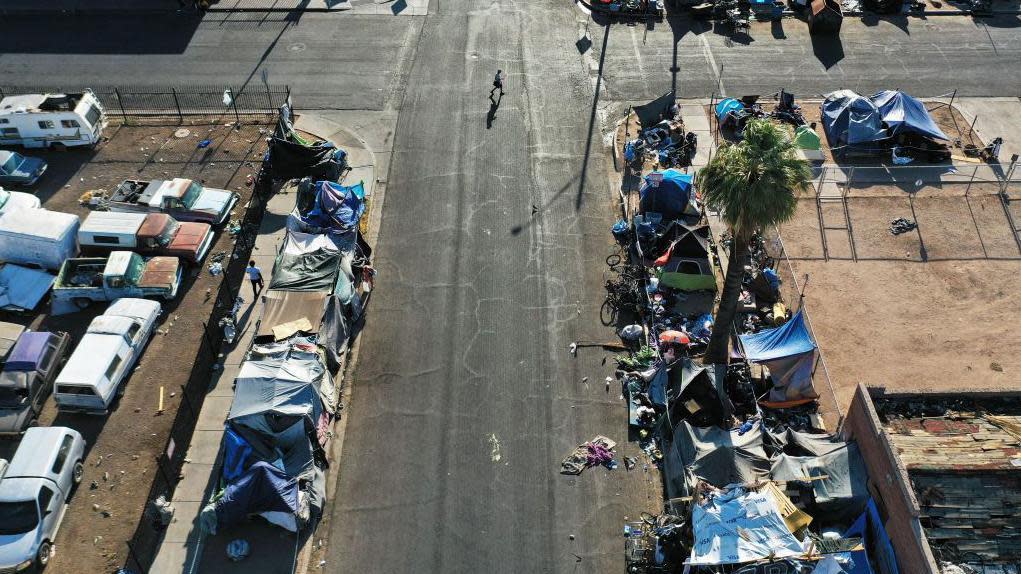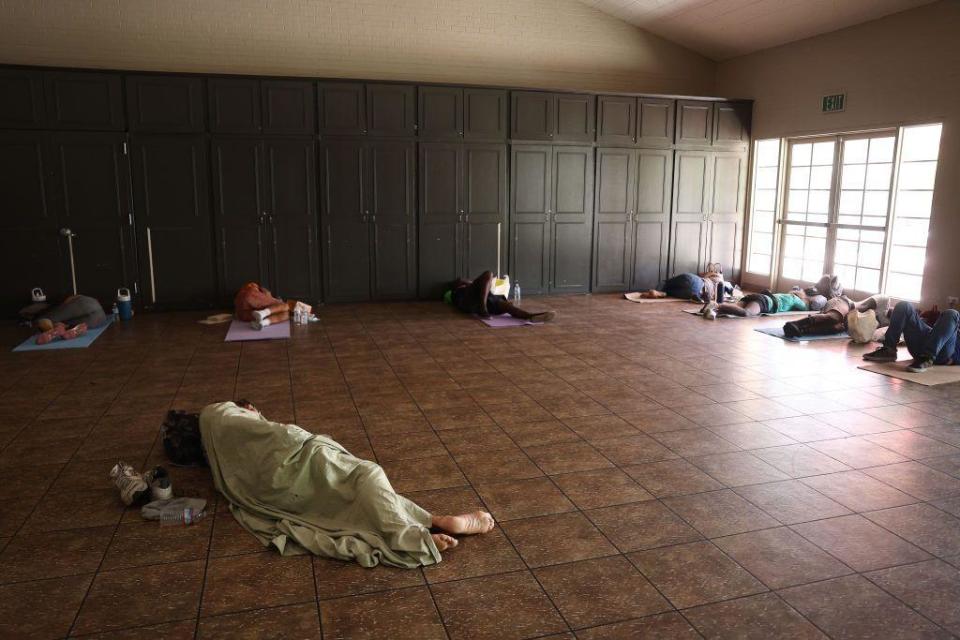Free air con? US cities look at new ways to prevent heat deaths

Mary Carter has survived scorching Phoenix summers for 40 years, but she found herself paralysed by the heat when the air conditioning in her small trailer stopped working.
Ms Carter, 73, stayed in the seven-foot-long trailer in Arizona for a month last summer as temperatures hit 115F (46.1C) or higher with no air circulating. A county programme offering financial aid for air conditioning units and repairs to eligible lower income residents eventually helped her.
"Without air, you can’t live in this town," she told the BBC. "Anyone who is trying to is crazy."
Temperatures are predicted on Thursday to reach 114F (45.5C) in the city. The daunting forecast has become a new normal for not just the American West, but for communities across the US and the globe as scientists say extreme weather events are becoming more frequent and intense with climate change.
The air conditioning programme is one avenue cities across the US are employing to fight extreme heat as health experts warn heat-related deaths are rising. Communities are being forced to take extra steps to help their most vulnerable populations - notably the homeless - survive.

Rising deaths each year
Last year, 645 people died from heat-related causes in Maricopa County, where Phoenix is located. The toll represented hundreds more deaths than any of the prior 10 years. Many of those who died in the county were homeless or low-income individuals, officials say.
The number of deaths in the county has risen each year. In 2013, there were 76 heat-related deaths recorded. Ten years later, the 645 deaths marked a jarring 784% increase.
The city started preparations for the sweltering summer months early this year, Brian Lee, the head of Phoenix's Office of Emergency Management, told the BBC.
"Our primary function first and foremost is to save lives, " Mr Lee said. "Every person we can get in an air-conditioned room with a bottle of water is one person we can potentially save.”
Maricopa County's emergency repair programme has helped about 700 people since 2021, with county funds set aside to pay for the services through at least 2026. Eligible residents who live in the county and meet certain income requirements can apply for help with home repair expenses, including HVAC repair.
Communication with residents on how to prepare for extreme heat began 1 May in Phoenix, Mr Lee said, in a "conscious effort to be ahead" of the spike in heat.
The first test for the city came earlier this month when an intense heat wave hit, bringing triple digits to major cities in the American West earlier in the season than usual.
Temperatures ranged from 114F (45.5C) to 121F in places including Las Vegas, Nevada, and Palm Springs and Death Valley in California. In some cities, temperature records were broken weeks before summer officially started.
The heat has forced officials to be more proactive in their response.
This year, Mr Lee's office identified new locations for people who are homeless to stay, including local libraries.
As the temperatures heat up, the needs of homeless and low income individuals change from places to sleep to places where they can wait out the heat and cool off - something experts say can save lives.
Last summer, Ms Carter's air conditioning unit stopped working after weeks of intense summer heat. It was not until she saw an advertisement for the Maricopa County air conditioning programme that she was able to get a reprieve from the heat.
"I couldn't even go to the bathroom it was so hot in there," she said.
The county sent a repair man to Ms Carter's trailer several days later and he determined she would need a new unit. The county replaced it for free, something Ms Carter said she would not have been able to afford.
Millions under heat alerts
Phoenix isn't alone in facing a deadly problem.
Extreme heat killed more than 1,500 people in the US in 2022, and half of those people were homeless, according to an Associated Press report, but exact figures on the number of heat-related deaths are hard to come by as they aren't officially tracked.
But based on data that is available, illness and deaths from extreme heat are rising, health experts warned in a 2022 report. They forecast a stark rise if the globe continues to warm.
The world hit 12 straight months of record-high temperatures, the European Union's Copernicus Climate Change Service said earlier this month.
Last month was the hottest-recorded May in history.
This week, the East Coast is experiencing the high temperatures that have become normal out West.
More than 70 million Americans are living under heat alerts as US cities, including Chicago, Detroit, Philadelphia, Boston and New York, see triple-digit temperatures.
As the heat gets worse, communities are searching for solutions in hopes of avoiding potentially deadly consequences, Steve Berg, chief policy officer at the National Alliance to End Homelessness, told BBC News.
Many major US cities prepare for snow and extreme cold by opening warming centres and ensuring homeless people have a place to go, Mr Berg said, but cities are now having to reckon with providing similar support for extreme heat.
"It's not something that can just be avoided or wished away," he said. "It's something communities need to get a handle on."


